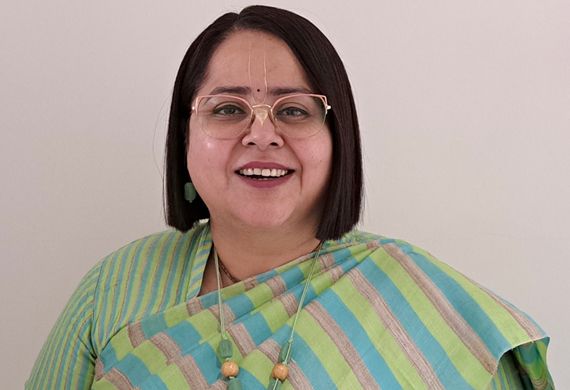
Governments, Industries & Consumers Crucial for Overcoming Sustainability Challenges
By: Aditi Mishal, Director- Centre for Sustainability & Professor, ATLAS SkillTech University
A pioneering women leader in sustainable development, Aditi Mishal brings 24 years of excellence in ESG, social entrepreneurship, academia, research, and corporate training. She began her career in 2010 with a PhD in sustainability and acquired experience in sustainability projects and then worked as a chief sustainability officer at an NGO for three years. Aditi recently returned to academics to drive sustainable development through youth engagement.
The Women Entrepreneurs Review Magazine recently interviewed Aditi who highlighted the significance of ESG adoption for all organizations. She also sheds light on the importance of adopting sustainability practices to safeguard our future generations. Here are choice excerpts from the conversation.
How can startups, the new economic development frontiers, integrate sustainable practices into their business models and incubate innovation and collaboration that helps tackle environmental and social challenges to achieve a sustainable future?
Sustainability should not be seen in bits and pieces; today there exists a comprehensive framework called ESG. Its important for organizations to work on this. This does not necessarily mean that the onus falls only on large-cap companies thathave been mandated by SEBI to implementESG. They alone cannot meet the criteria of mandate given by SEBI unless the mid-cap and the small-cap companies which are part of its value stream also comply with the ESG.
ESG is not just a regulatory compliance tick; it should be seen as a strategy driving organizations toward sustainability efforts. Value creation through ESG can occur in five ways: increasing top-line growth, reducing overall costs due to responsible consumption and production, shifting to renewable energy, avoiding costs through regulatory compliance, reducing scams, and providing access to green investment. ESG should be seen as a strategy, and it applies to startups, as sustainability startups are increasingly focusing on sustainability.
How can entrepreneurs effectively identify material sustainability issues and integrate them into their long-term strategy for competitive advantage and stakeholder engagement?
For example, a company planning to expand its pet bottle recycling facility under EPR (Extended Producer Responsibility) can benefit from sustainability entrepreneurs serving the larger purpose of FMCG as they can utilize much plastic recycled year after year. This can be achieved by implementing a guiding framework that includes proper board representation, discussions on sustainability and ESG integration, consideration of renewable energy sources, and a governance system for traceable plastic waste. This comprehensive framework provides a well-thought-out approach for entrepreneurs, ensuring they meet their criteria for plastic recycling and contribute to the overall success of the company.
How can sustainability startups ensure that the top decision-makers have a "sustainability mindset" and relevant expertise to guide CSR and sustainability initiatives effectively from the outset?
Sustainability Mindset, intention to comply, and capability are crucial factors in achieving success. There is a tremendous gap at this particular point in time, when it comes to the senior leadership at not only thestartups, small cap, mid cap, large cap, and all of the types of organizations. Leadership is often confused about what sustainability is; what strategy to adopt for incorporating sustainability; etc. Apart from confusion, there is also support comingfrom ESG consulting, through the Big Four consulting firms. A lot is being written and guided with regards to sustainability and ESG. This can provide great support to the senior leadership.
Startup Advisory plays a pivotal role in India, particularly in the context of sustainability. How does Startup Advisory assist sustainability startups in India in transforming challenges related to limited resources into opportunities for sustainable growth?
The dedicated effort to follow sustainability in manufacturing practicescan lead to a lot of operational cost savings. The focus on responsible consumption and production, judicious use of resources, and the circular economy are essential for sustainable manufacturing practices. By understanding life cycle analysis and recycling materials, organizations can effectively use frugal resources. Lean manufacturing principles and reverse supply chain practices also contribute to sustainable manufacturing. A dedicated effort to follow sustainability in manufacturing can lead to operational cost savings.
Drawing from your extensive experience in diverse fields and your passion for contributing to a more sustainable world, how do you envision the role of interdisciplinary collaboration in shaping innovative, sustainable solutions across industries and communities in today's rapidly evolving landscape?
A partnership is crucial for achieving Sustainable Development Goals, as mandated by SDG 17 since sustainability challenges are complex and multi-stakeholder. No organization can achieve it single-handedly as they are highly complex. SDG 2, zero hunger, addresses issues in sustainable agriculture at various stages, including production, distribution, cooking, serving, and consumption. These challenges are beyond the control of corporations, NGOs, governmental organizations, and communities.
These stakeholders belong to a value stream to meet varied SDG goals. The value stream of sustainable agriculture involves various stakeholders, including farmers, distribution, food waste reduction, and cooking methods. Farmers must adopt sustainable practices to ensure food security and nutritional security. Addressing food loss and waste, such as the transportation of green vegetables and making sure that those vegetables stay fresh, can help feed more people. Food waste reduction can also help feed the 168 million hungry people.
Governments, industries, and consumers all play a crucial role in achieving the SDG goal and overcoming sustainability challenges. By addressing food waste sustainably, we can feed all people and help meet the SDG goal.
Message to Readers
I am passionate about sustainability because I know I am responsible for the next generation. Sustainability is similar to the natural desire to provide the best for their children, including quality of life, education, health, access to housing, and financial security. Let us give a genuine thought to it and start contributing to sustainability to ensure the best for our future generations.
QUOTE: Sustainability is similar to the natural desire to provide the best for their children, including quality of life, education, health, access to housing, and financial security.


.jpg)



